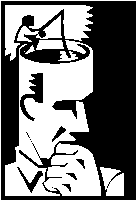ESE548 : The Class : Browsers | ||||||
 Browsers
Browsers
Internet Explorer --- Netscape Navigator --- Mosaic
A matter of personal preference
The more you know about using a browser, the easier it will be for you to get around the web. Your browser is the program you use to find things on the web. Each browser gives a certain feeling or format to the sites you visit.
It doesn't hurt to have two different browsers if you have enough memory to spare. It is actually rather interesting to try looking at pages or courses using one browser and then look at the same site using another browser. Personally, I find that Netscape Navigator works best for me when I am using the Macintosh, and Internet Explorer is a better tool for the way I use my PC.
I also found that I like different functions for e-mail. Each browser has an e-mail program. Try both kinds and see which one is easier for you --- more like the way your mind works. Learning Space has a nice overview of the tools and functions of browsers. Another site with lots of ideas about browsers and surfing the net: http://www.udel.edu/interlit/contents.html If you find this fascinating, try this site for lots more information about browsers, their history and access to all kinds of engines... .http://www.mnemonic.org//mnemonic/documentation/doc/www/altbrowsers.html
Two examples of browsers are Internet Explorer and Netscape Navigator. The most recent versions can be downloaded at the following addresses. Netscape Navigator update Internet Explorer update has a number of different download versions. Go to this web site and find the download that will match your system. In addition, there are a number of games encyclopedias and other programs available at the site.
 |
Updating a browser by downloading the latest version over the net takes some time, so set up a couple of hours - late evening often works fastest for long downloads. Of course, you can also buy the upgrades and receive a CD from the company that will load in moments |
Dictionary definition: A Web browser is a program (such as Netscape, Mosaic, or the Microsoft Internet Explorer,) that allows you to view web based information in a graphical format. The de facto standard for Web browsers is that they interpret HTML (HyperText Markup Language,) documents. Some browsers also interpret VRML (Virtual Reality Markup Language,) or Java, a language that allows sophisticated animation and other features to be added.
![]() Surfing the Net
Surfing the Net
Sometimes you will get an assignment that asks you to "surf the net." That is lingo for going to your browser and asking it to find something for you. There are lots of companies that are busy, day and night, sending out little "bots" that look for key words and then make catalogues of those words and how they work together. If you want to learn about students who have trouble learning, you might:
1. Pick a search engine - or bot
2. Tell it what you want to find by typing words in the box.
3. Wait while it looks for matches in its data.
4 Look at the list of sites that come back.
5. Decide if you want to refine your search by changing the wording or try another search engine.
 |
Just for fun, put your own name in the box and see what happens. Better yet, try several different engines and see what happens. Don't want to use your own name? Well, use mine, then. When I tried that I found there were towns with my name, that the search engine sometimes got things that did not make sense to me, and sometimes, it was right on target. I foundout that some of my articles were on the web - things that were published by journals, but I did not know they were on line. |
You will find a favorite search engine as you get more familiar with
"surfing." My favorite is: http://www.dogpile.com
![]()
Once you have finished you should:
Go back to Frequently Asked Questions
E-mail J'Anne Affeld at Janne.Affeld@nau.edu
Course developed by J'Anne
& Martha
Affeld
![]()
Copyright © 2000
Northern Arizona University
ALL RIGHTS RESERVED